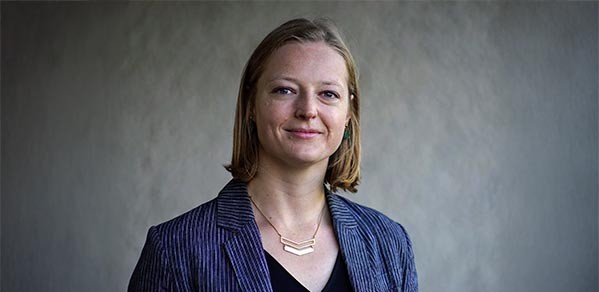
Emma Houiellebecq, Engineering PhD student and Gates Cambridge Scholar, has been announced as a winner of the Gates Cambridge Impact Prize 2025.
I am proud of the impact my research has had, both on the ground in the countries I have worked in, and on the International Committee of the Red Cross's operational strategy. It is good to have that work acknowledged.
Emma Houiellebecq
Emma is one of eight scholars presented with the Prize, awarded in recognition of the scholars’ positive impact on the world, namely in their shared desire to improve the lives of others. The winners receive £5,000 each and will be invited to participate in Gates Cambridge’s 25th anniversary events.
Emma was praised for her broad thinking on resilience and her on-the-ground experience. She has carried out fieldwork in some of the world’s most vulnerable regions – Ukraine, Gaza, Lebanon and Venezuela – honing her work to ensure that electricity and water supplies are maintained even in the toughest conditions.
A recipient of not one but two Gates Cambridge Scholarships (2016/2021), Emma’s previous work with the International Committee of the Red Cross (ICRC) on electricity supply in Gaza, helped ensure that a hospital in Khan Younis remained operational for months after the conflict escalated in October 2023.
Through her PhD, Emma explores a new systems-based approach to building resilience in conflict regions, which takes into account the whole chain of political, economic, social and technical issues that affect vital infrastructure.
In all these very different settings, Emma has been applying a systems mapping methodology to see how water and electricity services are being impacted by the fragility of the political and security situations. The mapping looks at causal relationships, for instance, the interactions and interdependencies affecting water supply.
“It is not just about technology issues, but about the political, economic and social background,” says Emma. “We are looking to identify the root cause of problems and vulnerabilities in the system. Often you find that a problem is actually a symptom of something else.”
She adds: “I am very proud of the impact my research has had, both on the ground in the countries I have worked in, and on the ICRC's operational strategy, in terms of shifting towards more systemic, resilience-building approaches in complex protracted crises. It is good to have that work acknowledged.”
Read more about Emma and her experiences.
Eilís Ferran, Provost of Gates Cambridge, said: “We are so happy to be celebrating Gates Cambridge’s quarter century by highlighting the achievements of our eight Impact Prize winners. They showcase the full diversity of scholars’ impact across the world in fields ranging from business, media and film to humanitarian work to research.
“For 25 years now, students from across the globe have come to Cambridge to work with us and become part of our community. As this Award shows, when they go back out into the world as Gates Cambridge Scholars, they make it a better place in ways no one could have predicted at the start. Whether a contribution as small as a podcast that touches a single human heart or vast as the potential of quantum science to tackle a range of global challenges, the possibilities we set in motion are infinite. This is the heart – and the wonder – of the Gates Cambridge mission. To create a limitless ripple effect of possibility and change.”
The judges of the Impact Prize were Professor Sir Leszek Borysiewicz, the 345th Vice-Chancellor of the University of Cambridge, former Chair of Cancer Research UK and the former Chief Executive of the Medical Research Council; Joe Cerrell, The Bill & Melinda Gates Foundation Managing Director for Europe, the Middle East and East Asia; Professor Tebello Nyokong, Distinguished Professor of Chemistry at Rhodes University and the 2009 L’Oréal-UNESCO Award for Women in Science recipient; and Dr Gillian Tett, the 45th Provost of King’s College London, Moral Money Co-Founder and Member of the Editorial Board and Columnist at the Financial Times.
Adapted from a University of Cambridge article written by Mandy Garner.

